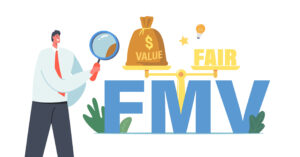 Mitchell Law Firm has previously discussed The Need for Fair Market Determination and now aims to educate on valuation methods and what to do if none of these methods work. Continue reading below to learn more.
Mitchell Law Firm has previously discussed The Need for Fair Market Determination and now aims to educate on valuation methods and what to do if none of these methods work. Continue reading below to learn more.
The IRS regulations provide three safe harbor methods that carry a presumption of reasonableness for the determination of fair market value of a share of stock in a private corporation. If a company utilizes any of the three safe harbor methods outlined below, its determination of FMV is presumed reasonable and the burden of proof would shift to the IRS to prove that the valuation was unreasonable.
Such a challenge by the IRS is possible but unlikely and using any of the three valuation methods described below will provide a heightened level of protection for the company making the FMV determination.
Three Valuation Methods
Outside Appraisal
The Company may obtain an outside appraisal conducted by an independent appraiser. The date of the appraisal must be within 12 months of the date of the relevant transaction for which the FMV valuation is being applied. As defined in the IRS regulations, an independent appraiser generally means an individual with verifiable education and experience in valuing the type of property or securities in question. Numerous companies and outside appraisers offer these types of appraisals and will deliver a written valuation report. The fee for such services can range from $1,000 – $10,000 depending on the complexity of the valuation, making the independent appraisal cost- prohibitive for many start-up ventures. When granting a stock option, for example, the Board of Directors may rely (and should rely) on the appraisal.
Valuation Formula
The Company may use a valuation formula that satisfies certain requirements, as further defined in detail by the IRS regulations. The valuation formula must satisfy the formulation for determining FMV in connection with a nonlapse restriction(as determined pursuant to 26 CFR §1.83-5) and must also be determined and valued in the same manner for purposes of any other transfer transaction, such as a redemption by the Company or transfer to an existing holder. Such a formula can be determined based on the current book value of the stock, a reasonable multiple of earnings, or a reasonable combination of such factors.
Written Report
The Company may prepare a written valuation report in good faith and applying the factors previously described in the IRS regulations. Such relevant factors include the tangible and intangible assets of the Company, the present value of anticipated future cash-flows, the value of stock in similarly-situated business enterprises, recent arm’s length transactions, and other relevant factors such as discounts for control premiums or lack of marketability. The written report safe harbor is only available for “illiquid stock of a start-up corporation”, meaning the Company has no material trade or business that has conducted for longer than 10 years and no class of equity securities traded on an established securities market, in addition to other restrictions defined in the IRS regulations. Furthermore, the written report must be prepared by individuals that the Company reasonably determines to have “significant knowledge, experience, education, or training” to conduct the report, generally meaning at least 5 years of relevant experience in business valuation or appraisal, financial accounting, investment banking, private equity, or other comparable experience in the relevant industry.
What if None of These Three Methods Work?
Companies that cannot rely on the safe harbor methods described above must instead determine the FMV of their stock based upon a reasonable application of the facts and circumstances on the valuation date and considering all available information, using the suggested factors further described in the IRS regulations.
Determining the FMV is a critical step in the equity process. By utilizing any of the three safe harbor methods described above, a Company’s determination of FMV is presumed to be reasonable and places the burden of any challenge squarely on the IRS, creating a heightened level of protection for the Company making the FMV determination. For start-ups that can afford to satisfy any of the 3 safe harbor methods, their determination of FMV will likely withstand any scrutiny and offer Founders the confidence that their FMV determination and issuance of equity awards will not be challenged by the IRS.
Disclaimer
The information provided in this article does not, and is not intended to, constitute legal advice; instead, all information, content, and materials available in this article are for general informational purposes only. Information in this article may not constitute the most up-to-date legal or other information. Readers of this article should contact their attorney to obtain advice with respect to any particular legal matter. No reader, user, or browser of this article should act or refrain from acting on the basis of information in this article without first seeking legal advice from counsel in the relevant jurisdiction. Only your individual attorney can provide assurances that the information contained herein – and your interpretation of it – is applicable or appropriate to your particular situation. Use of, and access to, this article or any of the resources contained herein do not create an attorney-client relationship between the reader, user, or browser and the author or The Mitchell Law Firm, A Professional Corporation. All liability with respect to actions taken or not taken based on the contents of this article are hereby expressly disclaimed. The content on this posting is provided “as is” and no representations are made that the content is error-free.

